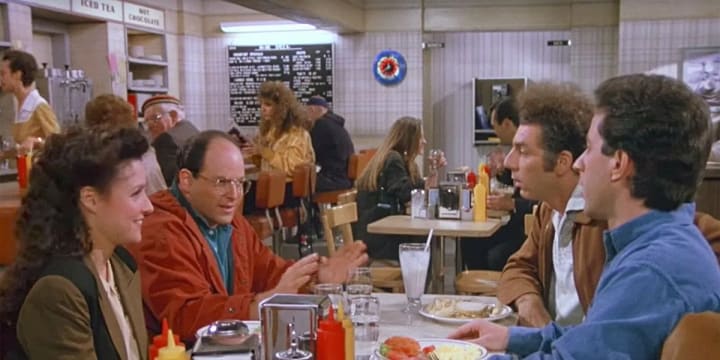A Look At The Narcissist Trope In TV Shows
Irredeemable or a cry for help?

We all know the type, rude, crude, and cares only about themselves, the narcissist trope is a character trait that has been prevalent in television and movies for decades. While we love and hate them for being so terrible and irredeemable, the question has to be asked: “Are they truly irredeemable?"
As there have been a growing number of dark comedies that feature self-obsessed narcissistic characters, we are beginning to see a new side to these villainous characters where it almost seems like they are asking for help in the only way they are able too. So let’s take a look at how the narcissist archetype has evolved throughout the years, explore how they are becoming three dimensional characters, and see if they are truly doomed by their own self-obsession.
Narcissistic Origins
The origin of the narcissist came from the story of Narcissus in Greek Mythology. The story was about Narcissus, a hunter who was cursed by Aphrodite for coldly turning down a beautiful woman named Echo. The curse made Narcissus fall in love with his own reflection in a river, leading to his eventual death.

This tale illustrated the destructive consequences of extreme self-obsession, and the importance of empathy and genuine connections with others. As time went on, narcissistic qualities became a defining characteristic for antagonists. This is especially found in Disney movies such as Gaston from Beauty and the Beast, Scar from the Lion King, and Ursula from The Little Mermaid and lead to the eventual conclusion that to be narcissistic meant to be evil or villainous.
In fact, we still continue to see these qualities in characters that we all should despise and antagonize. From the egotistical Zap Brannigan from Futurama to the psychopathic Homelander from The Boys to the irrelevant Gang from It’s Always Sunny in Philadelphia, the narcissist trope showcases the worst qualities of a human being, and as an audience we all sit and watch in enjoyment as they get what they deserved.
The Development Of Narcissism
In 1967, narcissism became a medical classification in the fields of mental illness with varying signs of origins. From what is displayed in main stream media, narcissism is developed by our surroundings and the people we associate ourselves with. So when we question why certain characters become so terrible and self-obsessed, not much info is given other than they had a bad upbringing.
As a result, writers in the past couple of decades have started to explore what causes this kind behavior in an attempt to create a new form of protagonist, one that goes through more struggle and hardship than your standard run of the mill protagonist.
One of the earliest examples of a narcissistic protagonist comes from the popular 1980’s sitcom Married… with Children. The show subverts the traditional family sitcom setup and showcases a family where nothing ever works out, no one takes accountability for their actions, and things always get worse for everybody because of their immoral behavior.

In comparison to their morally upstanding counterparts such as the Cosby's (The Cosby Show), and the Jefferson's (The Jeffersons) the Bundy's selfish behavior is derived from their poverty which has caused them to develop lazy, immoral, and opportunistic habits that sets themselves up for failure as each of them will gladly step on one another in order to be successful.
This eventually created the notion where selfishness and severe self-obsession are created from a lack of personal success within society. Fast forward twenty years later, and you see the same setup with friend groups sitcoms like in Seinfeld and It’s Always Sunny, where terrible people are trying to become successful, but they inadvertently foil each other and themselves. This also leads to the notion that one’s narcissism is developed in order to protect themselves from the shame and suffering of their failures.
The Road To Become Less Self-Obsessed
With the case of narcissism being defined as a self-defense mechanism to personal failures, writers have started to explore the notion whether or not narcissistic characters who are stuck in this personal rut can be redeemed. Michael Schur’s, The Good Place is a perfect example that showcases selfish people becoming genuinely good and moral by going through a journey of self-improvement and acceptance.

Seeing how someone as selfish and self-obsessed as Eleanor become a genuinely kind and caring person is a heartwarming story, but the journey that she had to go through in order to become that person took hundreds of years, symbolically telling viewers that change on a personal level is going to take time.
From a more relatable example, Jeff Winger from Community, is someone who displayed manipulative tendencies, and an over-inflated ego at the beginning of the series. However, as seasons progressed, it was revealed that he developed this ego in order to cope with his abandonment issues as a child.

While it took several years for him to confront his abandonment issues with his father, he realized that he doesn’t need to become an over-exaggerated version of himself to receive his father’s love and approval. Turning his character from a disconnected jerk to someone we can sympathize with. However, not all characters have a relatable back story and journey of self-improvement, as some characters take a while to beat this trope.
Being Less Terrible One Step At A Time
So it is possible for the characters under the narcissist trope to be morally redeemed, but they have to go through a personal journey of self-acceptance and hard work.
While some of our most beloved fictional narcissists won't change because of the nature of their respective shows, writers won't stop to showcase small genuine moments of kindness and we as an audience are split between if they are truly irredeemable or if they are just simply misunderstood.
In the case for the Gang from It’s Always Sunny, they are all textbook examples of narcissists who only do things that solely benefits them. However, there have been a few moments where they put aside their egos to support one another, like Dennis, Mac, and Dee throwing Charlie a surprise birthday party, Mac gifting Dennis a rocket launcher for Valentines Day, and Frank helping Mac come out of the closet to his dad. While these moments are surprisingly sweet and wholesome, they don't exactly last and they all go back to enabling their most absurd and selfish behaviors.
Another case of this scenario is Al Bundy from Married… with Children, who has openly expressed many times that his family is the cause of everything wrong with him. But when a car wash loses Al's car in the season nine episode “Get the Dodge Outta Hell”, the only thing that Al was worried about losing forever was an old picture of him and his family. Despite eleven seasons of stealing, cartoonish destruction, and blaming and complaining all of his existential troubles on his family, deep down inside Al truly cares about his family.
It’s moments like these where writers subvert people’s expectations of narcissists and humanize them into people who are simply placed in a predicament they are not able to get out of so easily. Unlike narcissistic characters in movies who lean towards sociopathic tendencies and are beyond redemption, it illustrates how some terrible people are not eternally doomed, but they just have trouble being kind because no one is kind to them.
Eternally Terrible?
While the narcissist trope showcased in movies often villainize people for their behavior and eternally doom them to whatever outcome they deserve, the television side of this trope highlights a more three dimensional character that goes beyond the means of traditional storytelling.
By showcasing their absolute worst and the cause of their self-obsessed tendencies, it can actually show us that there are more layers to these characters than we have initially thought. In fact, the argument can be made that terrible people are not truly terrible, but instead are misunderstood and defensive for their experiences and background. This can even arguably make them more relatable than our standard morally upstanding protagonists.

The gang from Seinfeld is a clear case for this, as the character's behavior and actions are deemed as rude and selfish by the other characters, but to the audience we often find ourselves in their shoes doing the same exact thing. While Jerry, George, Elaine, and Kramer all had respectable and arguably normal upbringings, their actions are often misunderstood by circumstance.
To Be Or Not To Be Narcissistic
When it comes to television shows about terrible people, we as an audience can't help but watch them and love them for being so terrible, but once we start to learn about their background and their personal tendencies we can't help but almost relate to their struggles.

Whether their struggles are due to their surroundings or by society, the narcissist trope is arguably one of the most three dimensional characters that we could see on television, because being classified as terrible and self-obsessed, but misunderstood is something we all can relate to at one point.
What do you think? Are narcissistic characters truly irredeemable or do they just need some therapy? If you liked what you read, be sure to follow for more related content!
About the Creator
Jay Kobayashi
A starving writer from LA who aspires to be plagiarized one day. I like to write about academic pieces that identifies philosophy and psychology in pop culture, and sometimes random fun pieces that interests me or the algorithm!






Comments
There are no comments for this story
Be the first to respond and start the conversation.